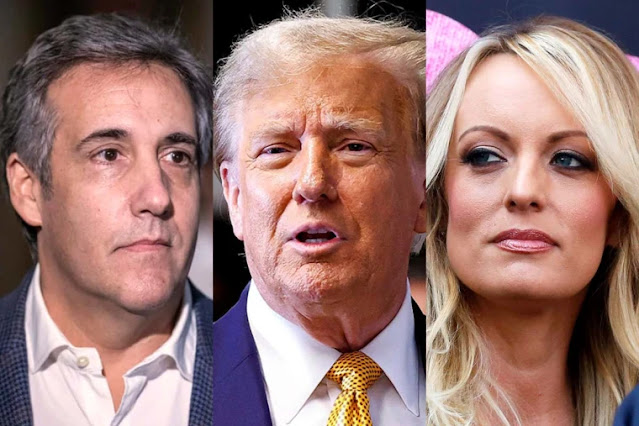The moment of truth is near for former President Trump, after defense lawyers and prosecutors delivered closing arguments Tuesday in his New York case.
The court’s day was prolonged well past its usual end time in order to hear summations in full — first from Todd Blanche in Trump’s defense and then from prosecutor Joshua Steinglass, who went on for nearly five hours.
Judge Juan Merchan is expected to give instructions to the jury Wednesday, after which the matter will rest in the jurors’ hands.
Trump is charged with 34 felony counts of falsifying business records.
Those charges stem from a $130,000 payment made to porn actor Stormy Daniels in the final stretch of the 2016 presidential campaign. Trump denies the affair and knowledge of the payment.
Here are five takeaways from Tuesday.
Trump team takes hard aim at Cohen’s credibility
Former Trump attorney Michael Cohen, who made the payment to Daniels to keep her from going public about the Trump affair, was always going to be a flawed star witness for the prosecution.
Cohen, who was later reimbursed from Trump’s personal bank account and from a Trump trust, served time in prison after pleading guilty in 2018 to tax evasion, violating campaign finance laws and lying to Congress.
The prosecution contends the reimbursements were falsely classified as legal expenses to conceal their true nature — part of a hush-money deal with Daniels. Prosecutors also say this was done to affect the election’s outcome, not merely to save Trump personal embarrassment, and therefore amounts to election interference.
Trump’s team argues the money paid to Cohen, who in the past said he would take a bullet for Trump but has also become an aggressive critic of the former president, was indeed for legal services.
Blanche sought to take a sledgehammer to Cohen’s credibility Tuesday.
The Trump attorney’s most memorable line came when he accused Cohen of being “the MVP of liars.”
Later, modifying a well-known acronym, Blanche called Cohen “the GLOAT: the greatest liar of all time.”
The soundbites were aimed at making the broader case that it would be unjust to convict Trump based upon Cohen’s tarnished word.
But there was one instance when Blanche seemed to overreach. It came when the attorney told the jurors they should not send Trump “to prison” based upon Cohen’s words.
The jury only decides whether to convict or acquit. In the event of a conviction, the sentence will be a matter for the judge.
After the jury was ushered out, Merchan told Blanche his statement was “highly inappropriate.” When the jury returned for the afternoon session, the judge told them to disregard Blanche’s comment.
Prosecution tries to stem doubts over Cohen
The prosecution knows the stakes when it comes to Cohen’s testimony, so Steinglass tried to shore up jurors’ faith in the former Trump lieutenant, even while acknowledging his flaws.
He defended Cohen’s stated desire to see Trump convicted, saying that given Cohen’s legal troubles, it was natural he would want to see Trump pay a price.
Steinglass defended the basic veracity of Cohen’s testimony while also arguing the case did not rest upon him.
He told the jurors that whether they liked Cohen was irrelevant.
“It’s whether he has useful, reliable information to give you … and the truth is that he was in the best position to know,” the prosecutor said.
“This case is not about Michael Cohen. It’s about Donald Trump.”
Defense tells jurors not to see case as Trump ‘referendum’
The question of how jurors will separate their feelings about Trump from the facts before them has hung over the case since the beginning.
Jury selection was aimed, in part, at weeding out potential jurors who had especially strong feelings toward the former president.
In his summing up, Blanche urged the jurors not to weigh the case as “a referendum on the ballot box — who you voted for in 2016 or 2020, who you plan on voting for in 2024.”
He added: “The verdict you have to reach has to do with the evidence you heard in this courtroom.”
More flashbacks to the ‘Access Hollywood’ tape
The trial has at times served as a reprise of the chaotic final stretch of the 2016 campaign.
To that effect, the lawyers’ summations made starkly different characterizations of the threat posed to Trump’s campaign by the release of the ‘Access Hollywood’ tape.
The tape, which emerged about one month before Election Day but dated from years previously, featured Trump boasting about how his fame enabled crude behavior toward women, including grabbing them by their genitals.
Steinglass, for the prosecution, said the tape’s release caused “pandemonium” within the Trump campaign.
Blanche, for Trump, said it was not a “doomsday event.”
The issue is important because the more severe the impact of the tape, the greater Trump’s political motivation to silence a new lurid allegation from Daniels.
A cameo appearance by Robert De Niro
President Biden’s campaign made its most assertive effort yet to wring political advantage from the trial.
Actor Robert De Niro — a longtime Trump critic who narrates a new Biden campaign ad — appeared near the courthouse, along with two former Capitol Police officers who were present during the Jan. 6, 2021, riot, Harry Dunn and Michael Fanone.
Most of the star power resided with the 80-year-old De Niro, who warned that Trump would “never leave” if he is reelected in November, and who cast the former president as a danger to the U.S. and the world.



.jpg)
















